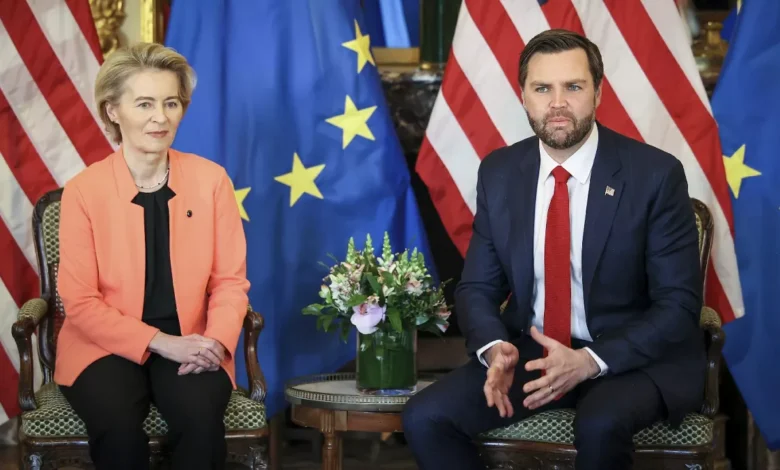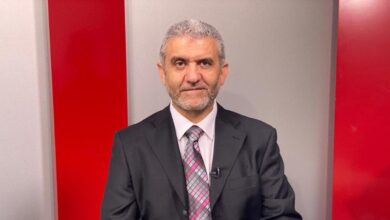
Alexander Hurst, The Guardian.
Trump and JD Vance are clear: the US is no longer an ally, but an antagonist to democratic values.
In 1966, after years of friction with the US over whether France should have its own independent nuclear deterrent, the French president, Charles de Gaulle, withdrew his country from Nato’s integrated command (not, however, from the alliance itself – a common misconception) and asked all US forces stationed in France to leave. In response, the US secretary of state, Dean Rusk, asked de Gaulle: “Does that include the dead Americans in military cemeteries as well?”
In a single weekend, JD Vance’s direct attacks on European democracy at the Munich Security Conference and his meeting with far-right, anti-European political forces in Germany, have given de Gaulle his historic vindication.
There are some things that you avoid saying for as long as you can, for fear that just uttering the words will help bring them into being.
For as long as Vladimir Putin has been in power, his geopolitical project has been twofold: to break apart Nato and the EU. Sowing doubt and scepticism has been a prime strategy towards that end. But a tipping point has been reached, and clinging to something that no longer exists is more dangerous than naming its disappearance, so here it is.
The “west”, in any coherent sense, is over.
Constructivist scholars of international relations hold that states’ interests are ultimately products of the systems of meaning that we create with each other. Many long viewed Nato as the pre-eminent example of constructivism in action. After the second world war, the Nato military alliance solved a trust gap by redefining European security as a collective affair. It thereby opened the door for European states to go even deeper in relinquishing some of their sovereignty in pursuit of political union as well.
Nato’s core members were also the core of the “west”, not only because they saw the Soviet Union as a threat, but because they had a “we-feeling” with each other. They practised liberal democracy, based on free and fair elections and the subjugation of pure power to the rule of law (not just domestically, but also internationally – even if imperfectly). In short, a values-based community, from which Elon Musk, Donald Trump, Vance and the US far right have self-deported.
In 2019, Emmanuel Macron generated a backlash by declaring NATO “brain dead,” only for the alliance to have a resurgence of purpose after Putin’s 2022 invasion of Ukraine. In reality, that resurgence has been more like terminal lucidity than resuscitation; Trump’s election was the pull of the plug. Whatever institutions may linger on impotently, or whatever meetings are held with the necessary diplomatic pomp, there is only one substantive and operative question. Does anyone truly believe that Trump would honour an invocation of article 5 of the Nato treaty, under which an attack on one member state is an attack on all?
Forget about benign neglect. With threats to conduct economic war or outright invade in order to annex Canada and Greenland, the US is now the primary menace facing its peaceful northern neighbour, and the second largest threat to its erstwhile European allies. The European public understands this: only 22% see the US as an ally.
In the same way as Nato cannot – for the moment – functionally exist without the US, its most powerful member, the “west” cannot conceptually exist when the country representing 35% of its roughly 1 billion inhabitants and more than 40% of its economy appears hostile to liberal democratic values under the rule of law, favouring instead a techno-nihilist oligarchy under competitive authoritarianism.
Musk is an acting, unelected monarch, whose minions have gone into secure government buildings, taken over IT systems and carried out wholesale information erasure. The administration has ended USAid without Congress’s approval – a move described as “unconstitutional and illegal” by Democratic lawmakers – thrusting millions into hunger, sickness and despair. Both Trump and Vance have suggested they could ignore court orders, install tens of thousands of loyalists, and wield the state as a weapon against journalists, activists and their political opposition. A purge of the federal civil service is already under way. As a bonus, Trump has also signed an executive order to halt the prosecution of Americans accused of bribing foreign government officials to win business. None of this radical remaking of the US constitutional order is hidden – Trump has, more than once, mentioned serving a third term, despite US presidential term limits. Only last weekend he invoked the ghost of Napoleon and appeared to declare he was utterly above the law when he posted: “He who saves his country does not violate any laws.”
Even if – and the probability of this is dropping fast – the US has free and fair elections in 2028 that remove Trump and the Republicans from power, there is no unbreaking what is now shattered. Not just domestically, but internationally. The US is unpredictable. A future “friendly” administration would be incapable of making any long-term commitments beyond its own stint in power. The sheer economic size of the US makes its current and future chaos untenable for the rest of the world, which must now try to cordon it off as much as possible. Perhaps with 100% import tariffs on Tesla to start – as Chrystia Freeland, a candidate to become Canada’s next prime minister, has been promoting – and quickly moving on to compensating for the Trump administration’s assault on global climate goals.
Europe’s leaders squandered a four-year reprieve, but perhaps the past days have finally impressed upon them that anarchy is, once again, what we make of it. A ban on X? Long overdue. Dependence on Starlink, SpaceX, or anything else Musk-related? The Trojan horse could not be more obvious even if it were literally written out in the stars.
Every bit of soft power that the US relinquishes, Europe should grab with both hands. For example, where USAid has been hobbled, the EU should see a prime opportunity to step in. And while we shouldn’t be under any illusions about China – an authoritarian state with imperialist territorial designs, colonialist economic policies all over the African continent and an atrocious human rights record – unlike the US, it is the only global player with the ability to move at the scale and speed necessary in decarbonising enough emissions for us to still have a chance of limiting global heating to 2C. If there is a chance to strike a climate-focused deal, the EU shouldn’t hesitate to prioritise doing so above the US’s eventual objections.
Certainly, Europe must be able to deter aggression entirely on its own – regardless of who the aggressor is. And then it should summon the spirit of de Gaulle and tell the US that its time on the continent is over. As for the dead Americans in military cemeteries? For now, at least, it is in Europe that the values they sacrificed themselves for still endure.





